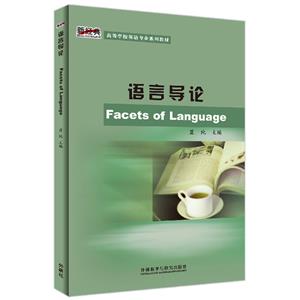-
>
西班牙语词根宝典
-
>
英语大书虫世界经典名译典藏书系:中国人的精神 (英汉对照)(精选权威版本)
-
>
许渊冲译唐诗三百首:汉文·英语
-
>
四级词汇词根+联想记忆法:乱序版
-
>
The secret garden
-
>
英国文学名篇选注
-
>
许渊冲译千家诗
语言导论 版权信息
- ISBN:9787521317923
- 条形码:9787521317923 ; 978-7-5213-1792-3
- 装帧:一般胶版纸
- 册数:暂无
- 重量:暂无
- 所属分类:>>
语言导论 本书特色
适读人群 :英语专业学生本书系统介绍语言学的基础知识。语言浅显易懂,生动有趣,将语言学的知识如讲故事般娓娓道来。教材在传输知识的同时注重启发学生思维,促进学生思考,激发学生进一步进行深入学习。教材释例丰富,而中英文兼顾,充分体现出理论与实践相结合的编写理念。
语言导论 内容简介
本书是供英语专业学生使用的语言学初级教材。全书共分11章,系统介绍语言学的基础知识。本书的语言浅显易懂,生动有趣,将语言学的知识如讲故事般娓娓道来。教材在传输知识的同时注重启发学生思维,促进学生思考,激发学生进一步进行深入学习。教材释例丰富,而中英文兼顾,充分体现出理论与实践相结合的编写理念。本教材经过多年试用,在此基础上精雕细作,日臻完善。
语言导论 目录
Chapter 1 Properties of Language
Chapter 2 The Structures of Language
Chapter 3 Meaning of Language
Chapter 4 Origins of Language
Chapter 5 Language in Use: The Pragmatic Perspective
Chapter 6 Language and Power
Chapter 7 Language and Gender
Chapter 8 First Language Acquisition
Chapter 9 Second Language Acquisition
Chapter 10 Language and the Brain
Chapter 11 Language, Metaphor and Thought
语言导论 节选
《语言导论(2020版)/新经典高等学校英语专业系列教材》:4.6 Rousseau and Herder's reflective theoryRousseau and Herder (1966) proposed an alternative view of language in a clear philosophical argument-the reflective theory of language origin.In their work, Rousseau and Herder stated that, "Man must come endowed with reason and hence endowed with language:' (1966: 127) To put it in another way, language is the twin brother of reasoning; the two were born together. To argue which comes before is to argue if the egg comes before chicken or vice versa. Just as by instinct the bee hums as it sucks and the bird sings as it nests, human beings are born with the capacity to reflect. Language began in silent reflection.According to Rousseau and Herder's observation, animals have keener senses than humans because the former have narrower sphere than the latter. The bee, for example, in its hive builds with a wisdom that a mother could not teach her children; but away from these cells and away from its predetermined activity in the cells, the bee is nothing. Human beings' activities are more varied, their attention more diffuse. Humans have senses for all things, big and small, near and far, present and absent. As a result, their sense for each one is weaker and duller. The narrower the sphere of an animal is, the less its need for language is. On the other hand, the more extensive the sphere of an animal is, the more differentiated its senses are, and the more its need for language is.Gradually human's organ evolved to the stage at which it was possible to produce sophisticated speech. But the organ doesn't cause speech to happen. According to Rousseau and Herder, even a mute person, as long as he/she reflects, has language lying in his/her soul.Rousseau and Herder were fully against the nature theory. They claimed that language is not a scream of emotions, nor an imitation of natural sounds. Birds can imitate very well, but they do not have a language. Nor is language an agreement of society, for the savage and the hermit living alone in the forest would also have had to invent a language for himself, even though he might never speak it. Language is rather a necessary agreement of the human soul with itself. It is human's reflective capacity that causes language to develop. Since the use of reason is natural to human, the use of language must be so as well.Rousseau and Herder also argued against the divine origin. As is mentioned earlier, they held the view that human beings are endowed with the twin capacities of language and reasoning. Even if there were a divine origin of language, human must have the ability to think clearly in order to be able to acquire the first syllable of divine instruction. What is more likely is that when human conceived the first clear thought, language was already present in his/her soul, being there through his/her own resources and not invented through divine instruction. Likewise, parents could never teach their children language without the children, by themselves, inventing language along with them. In other words, parents only facilitate and promote the language acquisition process for their children.……
语言导论 作者简介
蓝纯,北京外国语大学英语学院教授、博士生导师。1990年毕业于北京外国语大学英语系,1993年获北京外国语大学英语语言学硕士学位,2000年获香港理工大学英语语言学博士学位。主要研究领域为认知语言学、语用学、修辞学、翻译。已出版专著及教材十部,包括A Cognitive Approach to Spatial Metaphors in English and Chinese(2003)、《语用学与〈红楼梦〉赏析》(2007)、《语言导论》(2007)、《语言学概论》(2009)、《修辞学:理论与实践》(2010)),其中《语言导论》被评为2008年北京市高等教育精品教材,《语言学概论》被评为国家十二五规划教材;并在相关知名期刊上发表众多论文,其中包括《Linguistic Categorization导读》、《Pragmatics导读》、《认知语言学与隐喻研究》和《从认知角度看汉英空间隐喻》;另有译著四部,在国内外学术刊物上发表论文20余篇。2004年获霍英东教育基金高校优秀青年教师奖。目前面向研究生承担的主要课程有语用学、认知语言学、修辞学;面向本科生承担的主要课程有语音、语言学概论。
- >
二体千字文
二体千字文
¥14.0¥40.0 - >
小考拉的故事-套装共3册
小考拉的故事-套装共3册
¥36.7¥68.0 - >
中国历史的瞬间
中国历史的瞬间
¥16.7¥38.0 - >
新文学天穹两巨星--鲁迅与胡适/红烛学术丛书(红烛学术丛书)
新文学天穹两巨星--鲁迅与胡适/红烛学术丛书(红烛学术丛书)
¥9.9¥23.0 - >
月亮与六便士
月亮与六便士
¥18.1¥42.0 - >
企鹅口袋书系列·伟大的思想20:论自然选择(英汉双语)
企鹅口袋书系列·伟大的思想20:论自然选择(英汉双语)
¥6.3¥14.0 - >
罗庸西南联大授课录
罗庸西南联大授课录
¥13.8¥32.0 - >
我与地坛
我与地坛
¥27.2¥28.0
-
英语.非英语专业用(第三册)--高等学校文科教材
¥8.2¥12 -
4.23文创礼盒A款--“作家言我精神状态”
¥42.3¥206 -
4.23文创礼盒B款--“作家言我精神状态”
¥42.3¥206 -
一句顶一万句 (印签版)
¥40.4¥68 -
百年书评史散论
¥14.9¥38 -
1980年代:小说六记
¥52.8¥69





















